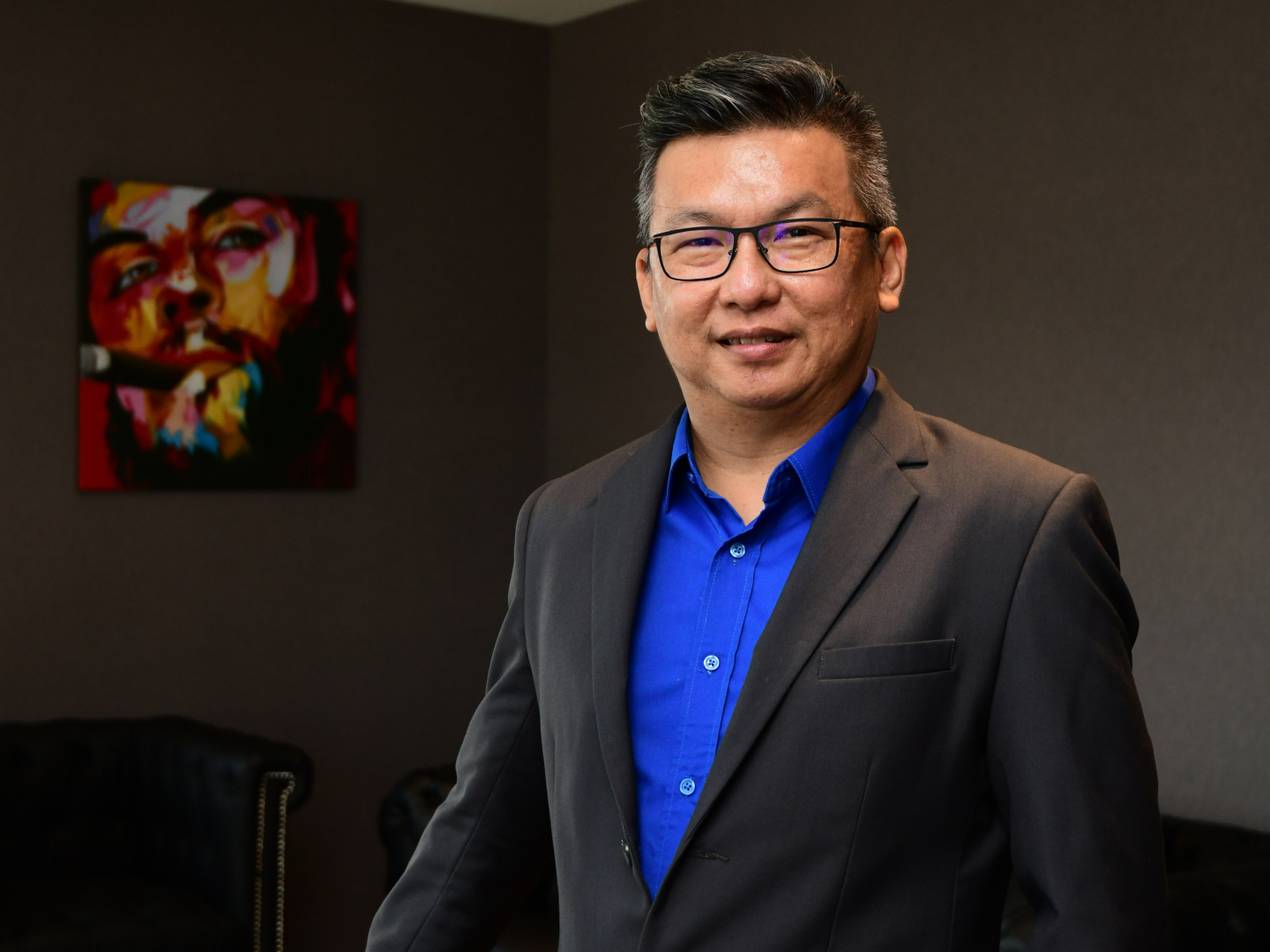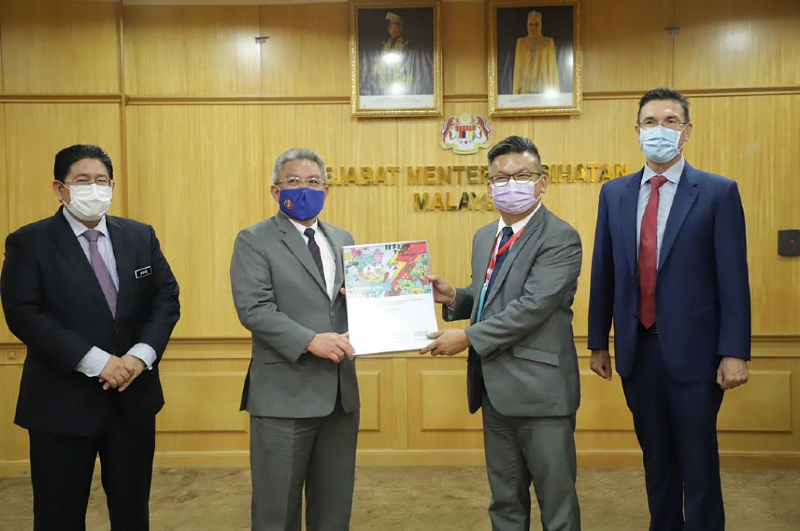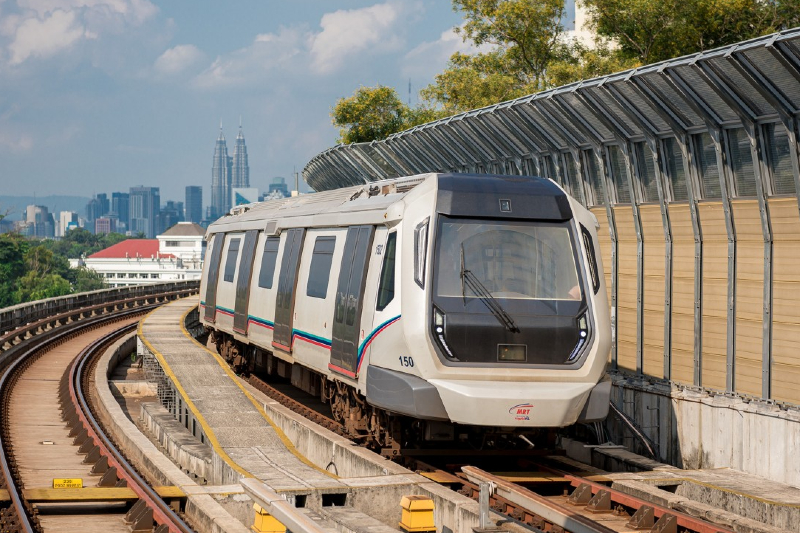
Yee is Siemens Malaysia's first local CEO (Photo: Patrick Goh/The Edge)
Che Guevara was a prominent figure in the Cuban Revolution and a guerrilla leader in South America who became a powerful symbol of revolutionary action. After his execution by the Bolivian army, he was regarded as a hero. Guevara’s portrait hangs prominently in the office of Adam Yee, Siemens Malaysia’s first Malaysian president and CEO, and I wonder what similarities the two men share — a thought I have only seconds to ponder before Yee walks into his office, and we are distracted by introductions.
We were meeting — in the short period of time during which face-to-face meetings were considered safe — at Siemens Malaysia’s office along the Sprint Highway in Petaling Jaya, which possesses the invaluable advantage of being considered a landmark, much like Motorola once was on the Federal Highway. The office also overlooks one of the many nation-building projects it has been involved in — the Kuala Lumpur MRT line, which is traversed by automated trains manufactured by Siemens.
The various CEOs of Siemens Malaysia have graced the pages of Options in years past, but none have been Malaysian. The trend is changing — locally-based MNCs, including Microsoft and Heineken Malaysia, have increasingly opted for local leaders instead of foreign appointees. “It’s something I am definitely very proud of,” Yee says as he poses for The Edge senior photographer Patrick Goh. “It makes so much sense to have a CEO from the country the business is based in and I really appreciate Siemens for empowering the local staff and giving them such opportunities.”
Bearing in mind the Covid-19 pandemic that we have been battling for the past year, his appointment seems especially prescient — his instinct for what is happening on the ground and insider knowledge of how Malaysians behave when caught off guard are likely to have contributed greatly to the company’s healthy bottom line (Siemens Malaysia registered double-digit growth in the first half of 2021) and its ability to support communities in need during the pandemic.
For example, it donated 25,000 Siemens Healthineers Covid-19 test kits worth RM528,800 to the Ministry of Health (MoH) early this year, and Yee personally assisted with mobilising unused laptops owned by the company to benefit school-going children who lacked the tools for home learning.
Last year, Siemens Malaysia completed the Paving the Pathway of Hope project, which provided road and bridge access for Orang Asli as well as improved sanitation for their villages. Conducted in collaboration with Yayasan Hijau, the project benefited about 80 Orang Asli families in Kampung Ulu Semul, Kampung Sagong and Kampung Ulu Tenlan, all in the interiors of Kuala Lipis, Pahang.
photo-002-siemens-moh1.jpg

Yee also made sure that the company partnered with reputable non-governmental organisations (NGOs) and on-ground partners to get the work done well, rather than send his own staff to environments they may not understand for the sake of a PR photograph. “We made sure we worked with these NGOs to ensure accountability — we want to contribute to society, but it is ideal to work with the right bodies to ensure the aid is delivered in the best possible way. You have to work with your own skill set,” he says.
This is a lesson Yee learnt early on in his career with the German engineering giant, whose first recorded sale in Malaysia dates back to 1908. Since then, the company has grown together with the economic and infrastructural development of the nation, having been involved in a multitude of industries — power generation and distribution, intelligent infrastructure for buildings and distributed energy systems, automation and digitalisation in the process and manufacturing industries, smart mobility solutions for rail and road transport, as well as medical technology and digital healthcare services.
Other than the MRT, Siemens has contributed to milestone nation-building projects that include the KLCC Twin Towers, the ERL Express city-airport connection, as well as resource-efficient and technologically-advanced gas turbines for the Prai and Pengerang power plant projects.
With experience in creating software solutions for the switchboard industry, Yee — a mechanical engineer by training — was hired in 2002 for his technical knowledge and put to work as a sales engineer for low-voltage products. “Being a technical person in sales is challenging — I am actually an introvert, but I had to become an extrovert to survive in sales and marketing,” he recalls. “On top of that, I had no customer base of my own as I came from a technical background.”
He turned his skills to his advantage, and sought out clients that would appreciate his knowledge of the business. It took four client meetings a day for months to see any success, but Yee had worked out what his strength was, and it lay in his technical capacity and instinct.
His success as well as the bold risks he took did not go unnoticed. For example, when he was invited in 2008 to join a segment of the company focused on electronics in infrastructure applications, he insisted on pursuing his interest and passion in manufacturing instead. This would also have meant giving up a possible posting overseas, but Yee did not want to disrupt his family’s stability. His calculated gamble paid off, as the industry he chose to stay in continued to grow.
inspiro-for-the-klang-valley.jpg

In 2010, he was offered the position of division head for industry automation and drive technologies. After two more promotions in the intervening years, Yee was elected president and CEO in November 2019 — just months prior to the start of the pandemic — while remaining senior vice-president of digital industries, which includes digital automation as well as smart home and smart building applications.
The position of CEO was not something Yee was aiming for or expecting, simply because at an MNC like Siemens, you can never actually predict the opportunity coming your way. Yee was the only Malaysian among the shortlisted candidates, and is rightly proud that he was selected.
“If you cannot find someone locally to do the job, then delegation from the company’s home country is necessary. But I believe there should always be a succession plan,” Yee says thoughtfully. “I emphasise this with my HR frequently — there needs to be enough local talent in the pipeline so we don’t have to bring people in from abroad, unless absolutely necessary. But once we do bring someone in, we need to pass on the learning because that is how you establish a truly sustainable business.”
The first president and CEO of Siemens Malaysia was Tan Sri Rainer Althoff, who Yee first met when he joined the company as a young man. Today, he remains in contact with the German native, who has since made Malaysia his home. “I cannot believe that I now have his role, and I can have coffee with him and talk about the business,” Yee quips.
For all the advice Althoff could have given him, few things would have prepared Yee for the months that were to come after he assumed the role — the pandemic that wreaked havoc all over the world, and closer to home, the series of lockdowns that affected the way essential industries operated. “No one expected such an unprecedented global event. We were supporting a number of essential industries like healthcare, F&B and manufacturing, so for us, the work had to continue while keeping our teams safe wherever they were,” he says.
“Remember how during the first MCO we couldn’t find enough loaves of Gardenia bread on supermarket shelves? We actually received a request from Gardenia to go to their factory and upgrade their automation processes. It was done through a partner company of Siemens as they wanted to upgrade their systems and increase productivity. That’s why you don’t see the same bread shortages now like you did last year.”
F&B is just one of several essential industries that Siemens Malaysia supports, which explains its good performance in a year in which many companies suffered. “We used to be very reliant on oil and gas, an industry that will recover in the coming years,” Yee shares. “The high demand for electronic devices and technical products like gloves, and also food and beverage has given us a huge boost. 2021 is set to be a recovery year for us, but we hope to rebound to pre-2019 levels — that means going well past our predictions to make up for lost time. This will also depend on factors like political stability, foreign investor confidence and the speed of vaccination.”
While dealing with the present, Siemens Malaysia has always had its eye on the future. Yee’s leadership focus is dual-pronged — pushing for awareness of Industrial Revolution 4.0 (IR4.0) in the country, and preparing the workforce for a rapidly changing job market. The two are connected, of course, and there is an urgency to get things moving along. “IR4.0 is happening very fast, the transition period is very short, and many things I’ve learnt before are no longer relevant. Now, we are just waiting for certain technologies to mature. It is already there,” he told Graduan.com in a 2018 article.
First coined in Germany in 2011, IR4.0 will see the integration of artificial intelligence (AI) and blistering-fast wireless connectivity and sensors into factories, allowing, among other things, an entire production line to make decisions on its own with minimal human intervention. Siemens Malaysia had started pushing for awareness of IR4.0 in the country as early as 2015 and is now one of the key partners working with the government to get businesses on board and ready for the shift, in particular with the Malaysian Investment Development Authority and the Ministry of International Trade and Industry.
“We are all still learning about IR4.0 and what it can do for us. In Malaysia, we must continue to push for skilled talent to take on the future. We need to help everyone experience IR4.0 to showcase how it works for them, and that’s how we can also increase talent development,” he says.
With the aim of preparing the workforce for a rapidly changing job market, the company is working with the Malaysian Technical University Network (MTUN) to come up with a syllabus for the university network’s bachelor’s degree program in industrial electronic automation. Content from the Siemens Industry Training Program for MTUN are embedded in syllabi at vocational-based universities such as Universiti Teknikal Malaysia Melaka, Universiti Malaysia Perlis, Universiti Tun Hussein Onn Malaysia and Universiti Malaysia Pahang.
siemens.jpg

Internally, the company embarked on upskilling its existing workforce with its technology partners, especially in the fields of mechatronics — it combines both mechanical and electronic skills — which is where IR4.0 will be most felt. This move addresses concerns that machines are taking over our jobs: while this is somewhat correct, what it also means is machines are in fact freeing up humans for work that makes better use their unique skill sets.
Yee and I are both old enough to recall campaigns that highlighted Malaysia’s capacity in manufacturing, featuring videos of women working diligently in semiconductor factories. Today, hi-tech machinery has taken over those jobs — but this only means the unique skills of these women can be used in different applications.
After all, humankind will survive this industrial revolution just like it survived the previous ones — the key is adapting to it. “When you embrace digital transformation, you are also creating new job opportunities, and these new jobs are unique. I believe that, as AI and machines take over routine and mundane jobs, humans will be open to more and more entrepreneurship.”
Yee is a firm believer in the tenets of hard work, loyalty and passion for what you do, which have stood him in good stead in his two decades with Siemens Malaysia. “I grew with the company, and I am often asked if I would do anything differently in my career. I always say that I regret nothing because each and every step built up to where I am today,” he shares.
As our interview draws to an end, I forget to ask what the Guevara painting represents to him, but the parallels are quite obvious; Guevara supported a revolution, was well-read and spearheaded a Cuban literacy campaign, and if you disregard his politics, also wanted to use his skills for the betterment of the society he lived in. Sounds familiar, no?
This article first appeared on June 21, 2021 in The Edge Malaysia.


